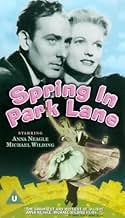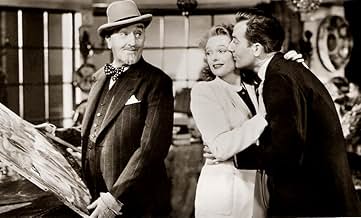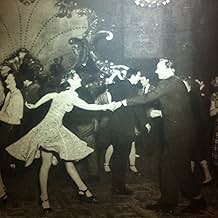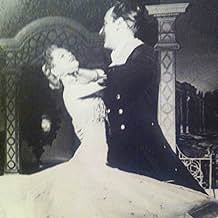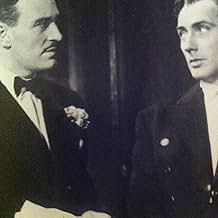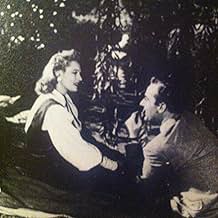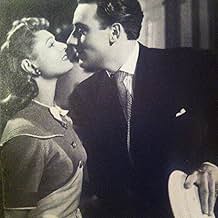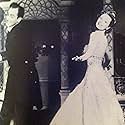AVALIAÇÃO DA IMDb
7,1/10
293
SUA AVALIAÇÃO
Adicionar um enredo no seu idiomaA diamond merchant's niece falls for his new footman who is really an impoverished aristocrat.A diamond merchant's niece falls for his new footman who is really an impoverished aristocrat.A diamond merchant's niece falls for his new footman who is really an impoverished aristocrat.
- Direção
- Roteiristas
- Artistas
- Prêmios
- 2 vitórias e 1 indicação no total
Cyril Conway
- Antique Dealer
- (não creditado)
Guy Deghy
- Porteus - Dinner Guest
- (não creditado)
H.R. Hignett
- Higgins
- (não creditado)
Tom Walls Jr.
- Bates
- (não creditado)
- Direção
- Roteiristas
- Elenco e equipe completos
- Produção, bilheteria e muito mais no IMDbPro
Avaliações em destaque
This film is pure joy. Back in the nineteen seventies I was a projectionist for several years and I remember my mother encouraging me to watch vintage movies to find out what real acting was about.
This one was one of the earliest I saw and I totally fell in love with it.
Set in London's west end, this is the tale of an impoverished Lord played with enormous charm and wit by Michael Wilding. He and Anna Neagle, his co-star, have great chemistry together, and really all the way through you can see they were made each other. The rest of the cast are all in top form and really this is a movie not to be missed if you love romantic comedies as I do.
This one was one of the earliest I saw and I totally fell in love with it.
Set in London's west end, this is the tale of an impoverished Lord played with enormous charm and wit by Michael Wilding. He and Anna Neagle, his co-star, have great chemistry together, and really all the way through you can see they were made each other. The rest of the cast are all in top form and really this is a movie not to be missed if you love romantic comedies as I do.
"What did you say, Richard?" "What did you say?" So, the leading ladies of "Spring in Park Lane" keep asking Richard. Richard is the new footman for the Howard household. In reality, he is Lord Richard Borechester. But, he's gone underground until he can solve a family crisis. It doesn't take one long to figure this out, so it's not giving any of the plot away.
The "what" that Richard says, that begets these questions throughout the film, is his use of interchangeable words. It's similar to malapropism -- use of a word that sounds like another, in place of the other, so that it's nonsensical or doesn't make sense. Most often those are unintended, so the person comes off as very funny, and possibly naïve or not well read. But in this case, Richard intentionally uses words that he then has to revise in wholly different sentences in order to give an acceptable answer.
The result is a double dose of comedy. First, in the out of place or contentious comment Richard makes, and then in his revised rejoinder. And, with those, the other parties to the comments show appropriate expressions of disbelief, indignity or shock. It's all very hilarious.
Anna Neagle and Michael Wilding are the leads in this upstairs-downstairs plot of a comedy romance. They are a wonderful match and starred together in half a dozen movies. All are very good, but their comedies especially stand out. Most of their pairings involve a couple of songs and/or dance numbers. Neagle and Wilding were highly popular screen stars in the U.K. in the mid-20th century. Wilding was known more in the U.S. around that time as having been the husband of Elizabeth Taylor - the second marriage for both. Unfortunately, most of the British films Wilding and Neagle were in didn't receive wide distribution at the time in the U.S. Both were very talented and likeable performers.
Wilding was something of a combination Danny Kaye and Cary Grant. He could act in a variety of genres but was superb in comedy. He brought an energy and sprightliness to his roles. Again, much like Kaye and Grant. He was quick fire with witty lines, and he could do some funny accents or voice imitations and sounds. Wilding did have one drawback - he sometimes rattled off a line or comment so quickly and almost hushed, that it was hard to hear him. One wonders if that was just a habit that directors couldn't get him to correct. Or, more likely, it was because he ad-libbed some lines, and they couldn't be filmed over with the same initial effect from the rest of the cast.
I don't know if the malaprops in the film come from the source book or from the playwright who wrote the film script. But, it's a very clever and unique method that works so well for this plot and the characters. Malaprops have been used ever since the beginning of sound film. But they have been mostly single instances for comedy. I don't think any other movie has been made that relies on such use of lingo as a huge part of its screenplay. For that reason alone, "Spring in Park Lane" stands out.
The movie is based on a 1916 novel by Alice Duer Miller, "Come Out of the Kitchen." Miller was an American author and suffragist, who wrote poetry, screenplays, and novels. Others of her poems and books were made into movies. Among the films are "Manslaughter" of 1930, "Roberta" of 1935, "The White Cliffs of Dover" of 1944, and "Lovely to Look At" of 1952.
"Spring in Park Lane" also belongs to a small group of films in which the butlers and/or maids are principals in the plot and provide much of the comedy. The best known of these probably is "My Man Godfrey" of 1936. But there are half a dozen others - this one among them, which are as funny as or better than Godfrey.
Here are some sample lines from the film. For more funny dialog, see the Quotes section under this IMDb Web page of the movie.
Judy Howard, "Richard, why don't you just go to the police and take what's coming to you?" Lord Richard, "The police? What on earth for? I haven't done anything." Judy, "Oh, well, you've answered that one anyway."
Uncle Joshua Howard, "Mildred, in affairs of the heart, you have all the delicacy of a bulldozer."
Lord Richard, "You're very beautiful, if I may say so, Miss Judy." Judy Howard, "What was that?" Richard, "I said it was a very beautiful evening, miss." Judy, "Did you?"
Uncle Joshua Howard, "Hmm. I don't mind Judy marrying blue blood, but I'm not very partial to red ink."
Rosie, "Mr. Maitland, I've got one of your photos. Do you think you could meet me on the back stairs in five minutes to sign it? It's a bit dark there. But Richard says that sometimes that's where a star's born."
Judy Howard, "Are you in the habit of making love to your employer's secretary?" Lord Richard, "No, miss. That was my first experience in that branch of domestic service."
Judy is playing the piano and Richard is polishing the floor and looking at her legs. When he slips and makes a noise she stops playing and comes around the piano. Judy, "You um, like music, Richard?" Lord Richard, "Yes, miss, especially pretty feet." Judy, "What did you say?" Richard, "I said, especially that petite suite, miss." Judy, "Which petite suite?" Richard, "That Petite Suite of Tchaikovsky you were just playing." Judy, "Oh, mmm. That's what it sounded like?" Richard, "Oh, yes, vaguely, miss, heh, heh." Judy, "It may have sounded like it, Richard, but it was not the Petite Suite of Tchaikovsky." Richard, "No, miss?" Judy, "No, Richard."
The "what" that Richard says, that begets these questions throughout the film, is his use of interchangeable words. It's similar to malapropism -- use of a word that sounds like another, in place of the other, so that it's nonsensical or doesn't make sense. Most often those are unintended, so the person comes off as very funny, and possibly naïve or not well read. But in this case, Richard intentionally uses words that he then has to revise in wholly different sentences in order to give an acceptable answer.
The result is a double dose of comedy. First, in the out of place or contentious comment Richard makes, and then in his revised rejoinder. And, with those, the other parties to the comments show appropriate expressions of disbelief, indignity or shock. It's all very hilarious.
Anna Neagle and Michael Wilding are the leads in this upstairs-downstairs plot of a comedy romance. They are a wonderful match and starred together in half a dozen movies. All are very good, but their comedies especially stand out. Most of their pairings involve a couple of songs and/or dance numbers. Neagle and Wilding were highly popular screen stars in the U.K. in the mid-20th century. Wilding was known more in the U.S. around that time as having been the husband of Elizabeth Taylor - the second marriage for both. Unfortunately, most of the British films Wilding and Neagle were in didn't receive wide distribution at the time in the U.S. Both were very talented and likeable performers.
Wilding was something of a combination Danny Kaye and Cary Grant. He could act in a variety of genres but was superb in comedy. He brought an energy and sprightliness to his roles. Again, much like Kaye and Grant. He was quick fire with witty lines, and he could do some funny accents or voice imitations and sounds. Wilding did have one drawback - he sometimes rattled off a line or comment so quickly and almost hushed, that it was hard to hear him. One wonders if that was just a habit that directors couldn't get him to correct. Or, more likely, it was because he ad-libbed some lines, and they couldn't be filmed over with the same initial effect from the rest of the cast.
I don't know if the malaprops in the film come from the source book or from the playwright who wrote the film script. But, it's a very clever and unique method that works so well for this plot and the characters. Malaprops have been used ever since the beginning of sound film. But they have been mostly single instances for comedy. I don't think any other movie has been made that relies on such use of lingo as a huge part of its screenplay. For that reason alone, "Spring in Park Lane" stands out.
The movie is based on a 1916 novel by Alice Duer Miller, "Come Out of the Kitchen." Miller was an American author and suffragist, who wrote poetry, screenplays, and novels. Others of her poems and books were made into movies. Among the films are "Manslaughter" of 1930, "Roberta" of 1935, "The White Cliffs of Dover" of 1944, and "Lovely to Look At" of 1952.
"Spring in Park Lane" also belongs to a small group of films in which the butlers and/or maids are principals in the plot and provide much of the comedy. The best known of these probably is "My Man Godfrey" of 1936. But there are half a dozen others - this one among them, which are as funny as or better than Godfrey.
Here are some sample lines from the film. For more funny dialog, see the Quotes section under this IMDb Web page of the movie.
Judy Howard, "Richard, why don't you just go to the police and take what's coming to you?" Lord Richard, "The police? What on earth for? I haven't done anything." Judy, "Oh, well, you've answered that one anyway."
Uncle Joshua Howard, "Mildred, in affairs of the heart, you have all the delicacy of a bulldozer."
Lord Richard, "You're very beautiful, if I may say so, Miss Judy." Judy Howard, "What was that?" Richard, "I said it was a very beautiful evening, miss." Judy, "Did you?"
Uncle Joshua Howard, "Hmm. I don't mind Judy marrying blue blood, but I'm not very partial to red ink."
Rosie, "Mr. Maitland, I've got one of your photos. Do you think you could meet me on the back stairs in five minutes to sign it? It's a bit dark there. But Richard says that sometimes that's where a star's born."
Judy Howard, "Are you in the habit of making love to your employer's secretary?" Lord Richard, "No, miss. That was my first experience in that branch of domestic service."
Judy is playing the piano and Richard is polishing the floor and looking at her legs. When he slips and makes a noise she stops playing and comes around the piano. Judy, "You um, like music, Richard?" Lord Richard, "Yes, miss, especially pretty feet." Judy, "What did you say?" Richard, "I said, especially that petite suite, miss." Judy, "Which petite suite?" Richard, "That Petite Suite of Tchaikovsky you were just playing." Judy, "Oh, mmm. That's what it sounded like?" Richard, "Oh, yes, vaguely, miss, heh, heh." Judy, "It may have sounded like it, Richard, but it was not the Petite Suite of Tchaikovsky." Richard, "No, miss?" Judy, "No, Richard."
When this film was released this country was in the grip of austerity so the sight of people living seemingly in another world of plenty was very appealing
This is one of my favourite movies of its type. I first saw it when it first appeared (sixty years ago), and I have seen it several times in recent years. It gets better with each viewing. It has a pretty believable plot, very good dialogue, and the characters are great. I wish films like this could still be made. It has, of course, no resemblance to real life today (for which heartfelt thanks), and in fact not much resemblance to the life when it was made, but who can resist the overall pleasant atmosphere? It is sad to relate that the sequel "Maytime in Mayfair" was a complete let-down. I am at a complete loss to understand why this excellent film isn't available on DVD.
Spring In Park Lane has Michael Wilding an aristocrat on the lam lest a family
scandal ensue getting a job with Tom Walls who's a nouveau riche type looking
to acquire a bit of culture. He takes a job as a footman with only butler G.H.
Mulcaster knowing his true identity.
But Anna Neagle who is secretary as well as daughter of Walls suspects early on that this servant is not all he seems. He's way too well educated and cultured for one in his line of work.
This is one light and airy confection with a great deal of the charm of this film residing in the charm and chemistry of the leads. Neagle and Wilding had that in abundance.
Others in the cast you will enjoy are Josephine Fitzgerald as the severe Irish housekeeper for Walls who finds Wilding a most agreeable bridge partner and Nicholas Phipps as one of those empty headed twits who have titles. He's also the Marquis of Borechester the family title of which Wilding is a possible heir.
If you like your British films light and airy you can't go wrong with Spring In Park Lane.
But Anna Neagle who is secretary as well as daughter of Walls suspects early on that this servant is not all he seems. He's way too well educated and cultured for one in his line of work.
This is one light and airy confection with a great deal of the charm of this film residing in the charm and chemistry of the leads. Neagle and Wilding had that in abundance.
Others in the cast you will enjoy are Josephine Fitzgerald as the severe Irish housekeeper for Walls who finds Wilding a most agreeable bridge partner and Nicholas Phipps as one of those empty headed twits who have titles. He's also the Marquis of Borechester the family title of which Wilding is a possible heir.
If you like your British films light and airy you can't go wrong with Spring In Park Lane.
Você sabia?
- Curiosidades"Loucuras da Primavera (1948)" was the most popular film in the U.K. for the year 1948. According to the British Film Institute in 2004, it had fifth place in all-time ticket sales in the United Kingdom. As of 2017, its 20.5 million U.K. attendance was still the largest audience for any wholly British movie. It was highly rated and well received in the U.S. as well.
- Erros de gravaçãoMichael Wilding and Anna Neagle misquote the beginning of a poem by William Allingham (whose title is the same as the first line) as "Four ducks on a pond,/The blue sky beyond." It should be "Four ducks on a pond,/A grass-bank beyond,/A blue sky of spring/And birds on the wing."
- Citações
Judy Howard: Well, where is Perkins?
Lord Richard: Oh, he's butling about somewhere.
- Cenas durante ou pós-créditosAbout one-third into the movie, the screen runs credits that introduce the Borechester family: "Borechester Towers. Ancestral seat of the Marquis of Borechester. "A.D. 1100. The Normans started building the walls... "A.D. 1300. The family started hanging their pictures on the walls... "A.D. 1939. The R.A.F. took over and started scribbling on the walls... "A.D. 1947. A Stately home of England -- with the state coming nearer every budget."
- ConexõesFeatured in The Ultimate Film (2004)
Principais escolhas
Faça login para avaliar e ver a lista de recomendações personalizadas
Detalhes
- Data de lançamento
- País de origem
- Idioma
- Também conhecido como
- Spring in Park Lane
- Locações de filme
- Metro-Goldwyn-Mayer British Studios, Elstree, Herts, Inglaterra, Reino Unido(studio: produced at Metro-Goldwyn-Mayer British Studios, Ltd. Elstree-Herts, England.)
- Empresas de produção
- Consulte mais créditos da empresa na IMDbPro
- Tempo de duração
- 1 h 40 min(100 min)
- Cor
- Proporção
- 1.37 : 1
Contribua para esta página
Sugerir uma alteração ou adicionar conteúdo ausente

